Unit 4 Don't eat in class.Section B1a-2c听说课课件(共72张PPT,内嵌视频及音频)
文档属性
| 名称 | Unit 4 Don't eat in class.Section B1a-2c听说课课件(共72张PPT,内嵌视频及音频) | 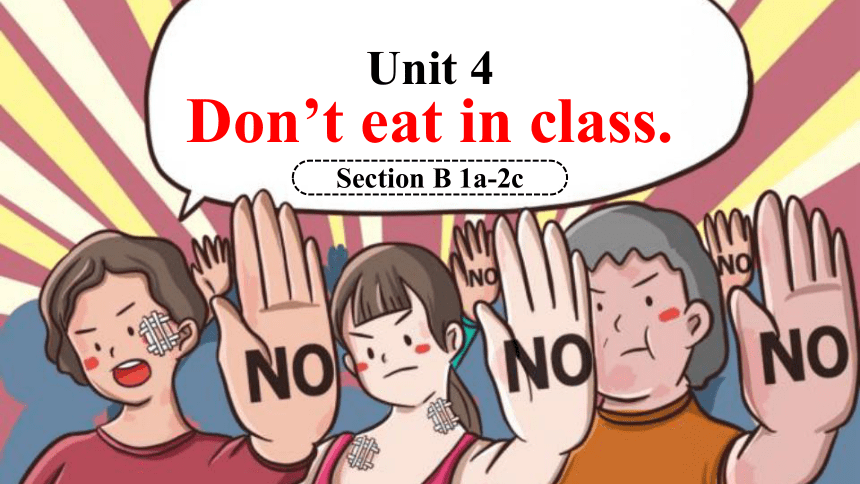 | |
| 格式 | pptx | ||
| 文件大小 | 16.1MB | ||
| 资源类型 | 教案 | ||
| 版本资源 | 人教新目标(Go for it)版 | ||
| 科目 | 英语 | ||
| 更新时间 | 2024-01-03 02:13:13 | ||
图片预览

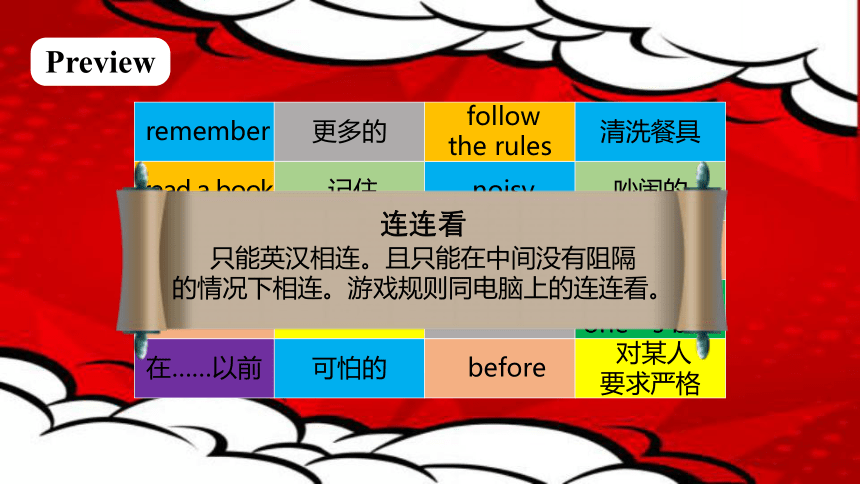
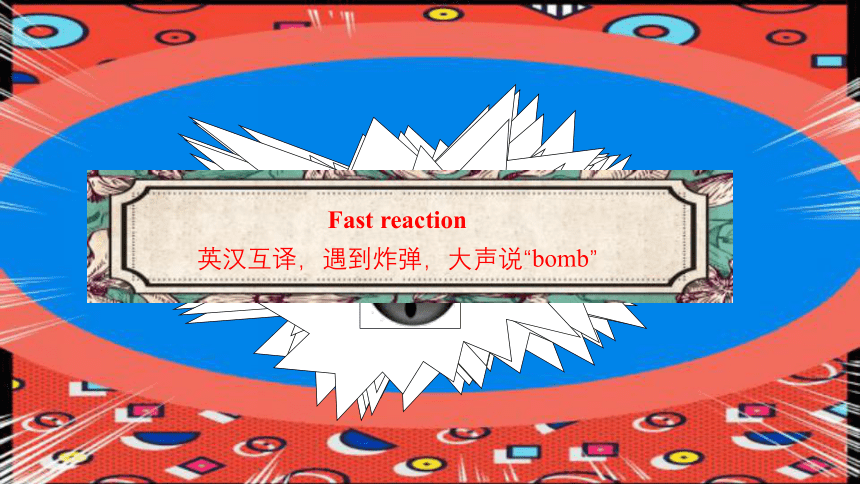
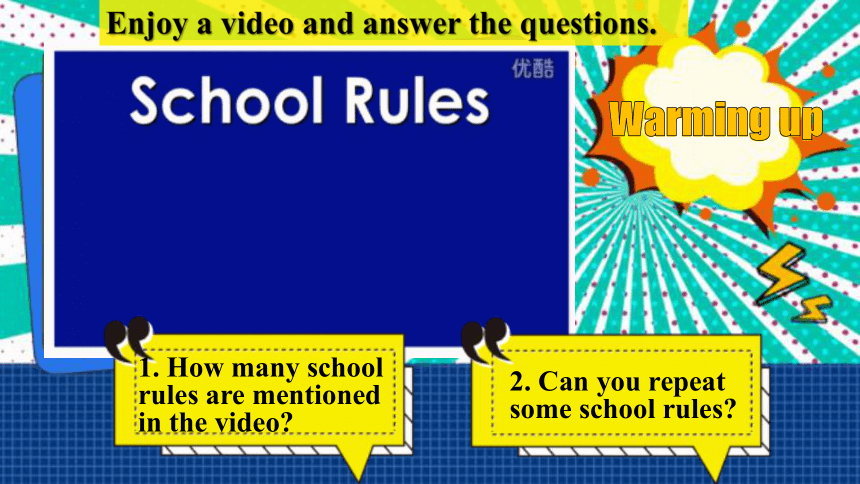
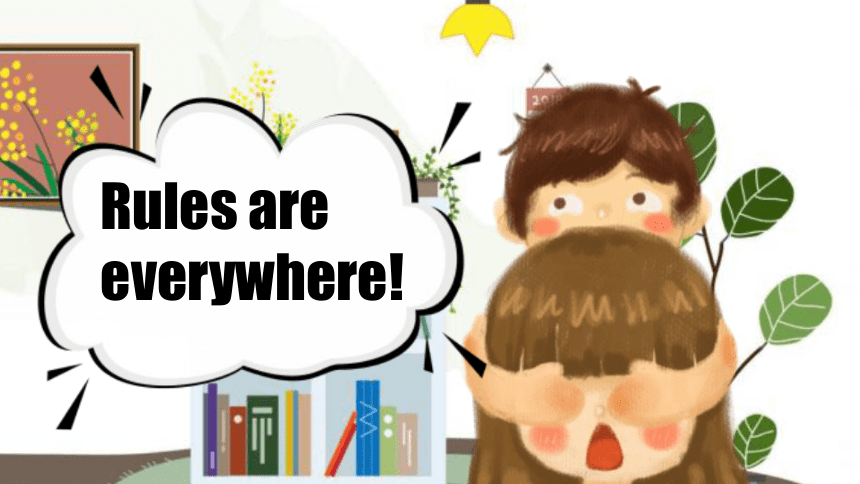
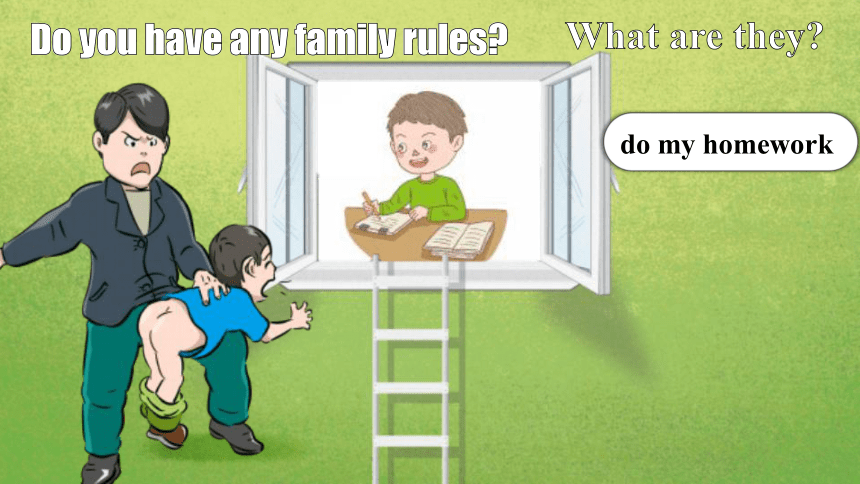
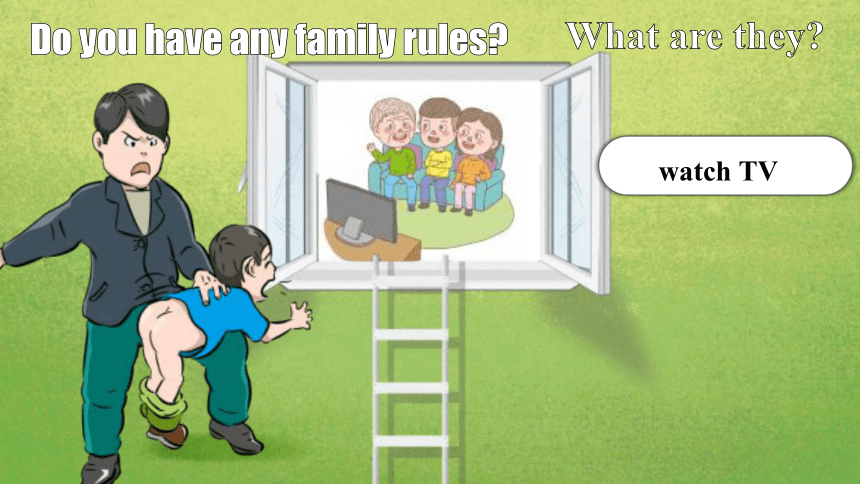

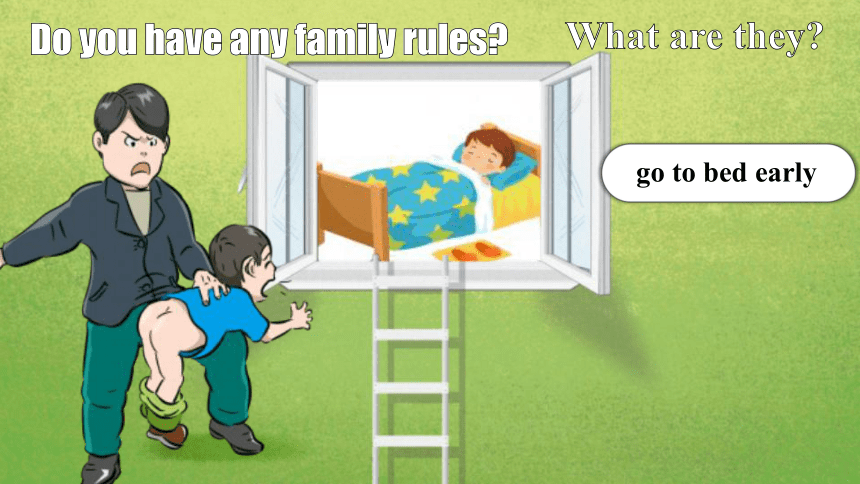
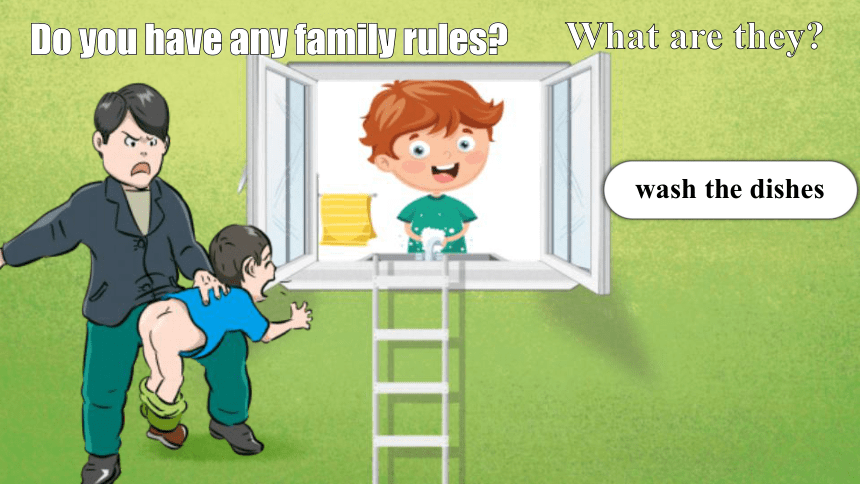


文档简介
(共72张PPT)
Unit 4
Don’t eat in class.
Section B 1a-2c
do the dishes
遵守规则
铺床
more
记住
noisy
吵闹的
terrible
make
one’s bed
可怕的
before
对某人
要求严格
更多的
follow
the rules
清洗餐具
remember
read a book
be strict with
读书
在……以前
Preview
连连看
只能英汉相连。且只能在中间没有阻隔
的情况下相连。游戏规则同电脑上的连连看。
太可怕了。
父母有时是很严格的。
睡觉前我
必须要先读书。
We have more rules.
祝你好运。
I know how you feel.
We have to follow them.
Don’t be noisy.
Fast reaction
英汉互译,遇到炸弹,大声说“bomb”
Warming up
Enjoy a video and answer the questions.
2. Can you repeat some school rules
1. How many school rules are mentioned
in the video
Rules are
everywhere!
Do you have any family rules
What are they
do my homework
Do you have any family rules
What are they
watch TV
Do you have any family rules
What are they
clean the room
Do you have any family rules
What are they
go to bed early
Do you have any family rules
What are they
wash the dishes
Do you have any family rules
What are they
wash the clothes
When can you go out
Is the boy at home now
go out 外出(娱乐)
out /a t/ adv. 外出
Pre-listening
Look and answer.
Pre-listening
Look and answer.
What’s he doing
Is the boy out or is he at home
see friends 看望朋友
Pre-listening
Look and answer.
Do you often do the dishes at home
What’s he doing
do the dishes 清洗餐具
dish /d / n. 碟;盘
Pre-listening
Look and answer.
When do you often do your homework
What’s he doing
do his homework
做他的家庭作业
Pre-listening
Look and answer.
Do you often help your mom with breakfast
What’s the boy doing
help his mom make breakfast
帮他的妈妈做早饭
Pre-listening
Look and answer.
Can you play the guitar
What’s he doing
practice the guitar 练习吉他
practice / pr kt s / v. & n. 练习
Pre-listening
Look and answer.
How long can you watch TV every day
What’s he doing
watch TV 看电视
Pre-listening
Look and answer.
Do you have to clean your room
What’s he doing
clean his room
打扫他的房间
Read the rules in the chart in 1b. Then match the pictures [a-h] with the rules.
1a
a
c
e
g
b
d
f
h
Rules Can’t(×) Have to/Must(√) When
a go out on school nights
see friends
do his homework
practice the guitar
do the dishes
watch TV
help his mom make breakfast
clean his room
h
c
e
b
g
d
f
×
Are they
school rules or
family rules
Family rules
Look at the chart. What do you think Dave can’t do
What do you think he has to or he must do
Rules Can’t(×) Have to/Must(√) When
a go out on school nights
see friends
do his homework
practice the guitar
do the dishes
watch TV
help his mom make breakfast
clean his room
h
c
e
b
g
d
f
×
While-listening
Listen and put an × for things Dave can’t do and a √ for things he has to do.
1b
Rules Can’t(×) Have to/Must(√) When
a go out on school nights
see friends
do his homework
practice the guitar
do the dishes
watch TV
help his mom make breakfast
clean his room
h
c
e
b
g
d
f
×
Can't David go out at any time
No. Just on nights.
Pre-listening
Predict when Dave does the things in the chart in 1b
on school nights every Saturday before dinner in the evening
on school days after dinner after school every morning
before /b f (r)/ prep.& conj. 在……以前;adv. 以前
While-listening
Listen again. Write when Dave has to follow the rules in the chart in 1b. Choose from the phrases in the box.
1c
Rules Can’t(×) Have to/Must(√) When
a go out on school nights
see friends
do his homework
practice the guitar
do the dishes
watch TV
help his mom make breakfast
clean his room
h
c
e
b
g
d
f
×
on school days
after school
before dinner
after dinner
in the evening
every morning
every Saturday
Remember to do the right things
at proper time.
Talk about the rules in Dave’s house.
1d
No, he can’t.
Can Dave go out on school nights
These expressions
may help you
on school nights
on school days
after school
before dinner
after dinner
in the evening
every morning
every Saturday
Pre-listening
Make conversations in groups according to the truth of yourself. And give a report.
A: Do you have any family rules
BCD: Yes, we do.
A: Can you _________ on school nights
B: Yes, I can, but I must _____________________________.
C: Me too. I can only _________ _____________.
D: No, I can’t. I have to _______________.
go out
get back home before 10 o’clock
go out
on weekends
stay at home
Group work
Read the rules.
Which rules do you like
Which rules don’t you like
a. You can go out on school nights.
b. You can’t see your friends on school days.
c. You don’t have to clean your room.
d. You must go to bed before 9:30 on school days.
e. You can watch TV on school nights.
f. You have to do your homework after school.
g. Don’t eat outside.
h. You don’t have to do the dishes after dinner.
Do you think
your family rules are fair
Pre-reading
If you are not pleased with your school rules or family rules, who will you ask for help
Your friends
Your teacher
Your parents
2a
西方学生的求助信
在英美等国家,当学生感受到精神压力大或者在家庭和学校遇到不愉快的事情,同时又无法或不愿与家长、老师及好友交流来释放压力时,他们往往会选择写“求助信”的方式,向自己信赖的心理辅导专员或者专业人士倾诉自己的烦恼,以期得到解决问题的方法。
求助信是书信的一种,随着互联网的出现和电脑的普及,当今越来越多的学生选择更加便利的电邮形式通过网络进行救助咨询。但无论是传统书信还是电子邮件的形式,求助信都属于较为正式的书信文体。
I’m Dr. Know(知心博士).
Pre-reading
One girl called Molly feels unhappy. Let’s see
what she will do to make herself feel better.
While-reading
Read the letters and answer the questions.
There are too many rules!
What can I do
2. How do you know that Molly needs help?
1. What is the topic sentence in Molly's letter?
While-reading
Read the letters. Underline the rules for Molly.
2b
①
②
③
④
⑤
⑥
⑦
⑧
⑨
⑩
What do you think of Molly’s rules
or
Fair
Unfair
While-reading
If you were Dr. Know,
what would you say to Molly
Read the second letter and underline Dr. Know’s opinion.
Dear Molly,
I know how you feel. People always tell us, “Don’t do this!” or “You can’t do that!” But think about it, Molly. There are a lot of things you can do. You can play basketball on weekends. You can watch TV after you read a book. Parents and schools are sometimes strict, but remember, they make rules to help us. We have to follow them.
Good luck!
Dr. Know
Teachers and parents make rules to help us. We have to follow them.
follow the rules 遵守规则
Everyone should obey the rules.
每个人都应遵守规则。
If you don’t follow the rules,
you can’t do anything right.
没有规矩不成方圆。
Post-reading
Read the letters again and complete the sentences with have to/must, can or can’t.
2c
1.Molly _____ play basketball on school days, but she_____ play it on weekends.
2. Molly __________ do her homework first when she gets home.
3. Molly __________ read a book after dinner before she_____ watch TV.
4. At school, Molly _____be noisy or eat in class.
5. Parents and schools make rules to help students. So students
___________follow the rules.
can’t
can
has to/must
has to/must
can
can’t
have to/must
Pre-reading
According the passage, fill in the blanks.
There are too many rules! (总领全文)
at 6:00 a.m. and______________
don’t leave the in the kitchen
can’t be _________
don’t be_________
don’t in class, ...
Para.1
Para.2
can’t after school,
must _________________
can’t _________________
must before watching TV,
have to go to bed ________________
make the bed
get up
dirty dishes
late
noisy
eat
play basketball
do the homework
relax
read a book
before 10:00
Molly’s letter
Ask for help
Pre-reading
Retell the passage with the mind map.
There are too many rules! (总领全文)
get up at 6:00 a.m. and make the bed
don’t leave the dirty dishes in the kitchen
can’t be late
don’t be noisy, don’t eat in class, ...
Para.1
Para.2
can’t play basketball after school,
must do the homework
can’t relax
must read a book before watching TV, have to go to bed before 10:00
I know how you feel. (引出下文)
there are a lot of things you can do: play basketball on weekends,
watch TV after you read a book
they make rules to help us
we have to follow them
Molly’s letter
Dr. Know’s letter
Ask for help
Reply the letter
Group work
Work in groups of four. Talk about the family rules. Then discuss and choose the most important four rules they all agree on. List the rules at last.
—What family rules
do you have
—No. I don’t think so. But...
—Do you think it’s fair
—Well, I must get up at 6:30 in the morning...
Post-reading
Can you say their meanings
make the bed ______________
leave the dirty dishes in the kitchen ________________
have more rules ____________
read a book ____________
be strict______________
follow the rules ____________
good luck____________
铺床;整理床铺
把脏餐具留在厨房里
有更多的规定
读一本书
严格的;严厉的
遵守规则
祝好运
Summary
go out, do the dishes, make one’s bed, be strict (with sb.),
follow the rules
能正确使用否定祈使句陈述规章要求
能使用情态动词can表示许可
Expressions
Grammar
Sentences
New words
out, practice, dish, before, dirty, kitchen, more, noisy, relax, read, terrible, feel, strict, remember, follow, luck
I must practice the guitar before dinner.
能正确使用have to和must谈论规章制度
I have to do my homework after school.
I can’t go out on school nights.
two letters about family rules
Reading
01
Language points
1. practice the guitar 练习吉他(教材P22 1b)
【用法详解】(1) practice 在此处作动词,其后可以接名词、代词或动词-ing形式作宾语。
You need to practice English every day. 你需要每天练习英语。
These foreigners are practicing speaking Chinese. 这些外国人正在练习说汉语。
(2) practice还可作名词,意为“练习”。
Practice makes perfect. 熟能生巧。
Learning English needs practice. 学习英语需要练习。
practice v.& n.练习
Point
02
Language points
2. do the dishes 清洗餐具 (教材P22 1b)
dish n.碟;盘
Point1
【用法详解】dish作可数名词,常用the dishes表示“(待清洗的)餐具”。dish还有“菜肴;一道菜”之意。
The glass dish is beautiful. 那个玻璃盘很漂亮。
This is an excellent hot main dish. 这是一道绝好的热主菜。
碟;盘
菜肴
02
Language points
2. do the dishes 清洗餐具 (教材P22 1b)
do the dishes 清洗餐具
Point2
【用法详解】do the dishes相当于wash the dishes。
We must do the dishes before we go out. 我们外出前必须清洗餐具。
03
Language points
3. before dinner 晚饭前 (教材P22 1c)
【用法详解】before 在此处为介词,意为“在……以前”,表示时间,反义词为 after(在……以后)。
You must go to bed before 10 o’clock. 你必须在10点前上床睡觉。
before prep.& conj.在……以前;adv. 以前
Point
Language points
【拓展延伸】
(1) before作介词,还可表示“在……的前面”,表示位置,其反义词为behind。
There is a desk before me and a chair behind me. 我的前面有一张课桌,后面有一把椅子。
(2) before还可作连词,意为“在……以前”,后接句子。
Do it before you forget. 尽早动手,免得忘了。
04
Language points
4. At school, we have more rules — don’t be noisy, don’t eat in
class, … 在学校,我们有更多的规定——不能喧哗,不要在课上吃东西,
……(教材P23 2b)
【用法详解】(1) more在此处作形容词,是many的比较级,修饰可数名词复数(rules)。more还可作much的比较级,修饰不可数名词。
I have more books than her. 我的书比她的多。
You should drink more water. 你应该多喝水。
more adj.& pron. 更多(的)
Point1
(2) more还可作代词,意为“更多”。
The cake is delicious. I want some more. 这蛋糕很好吃,我想再来一些。
Language points
05
【用法详解】noisy作形容词,其反义词为quiet(安静的)。
Turn down the TV. It’s too noisy. 把电视声音调小一些,太吵了。
noisy adj. 吵闹的
Point
【拓展延伸】noisy的名词形式为noise,意为“喧闹声;噪声”,作可数名词或不可数名词均可。
5. At school, we have more rules — don’t be noisy, don’t eat in
class, … 在学校,我们有更多的规定——不能喧哗,不要在课上吃东西,
……(教材P23 2b)
Language points
06
6. After dinner, I can’t relax either. 晚饭后我也不能放松。
(教材P23 2b)
【用法详解】relax作及物动词和不及物动词均可。relax oneself 意为“放松自己”。
Don’t be nervous. Just relax. 不要紧张,放松点。
She relaxes herself by listening to music. 她通过听音乐的方式来使自己放松。
relax v. 放松;休息
Point
Language points
07
7. I must read a book before I can watch TV. 在看电视之前我
必须先读一本书。(教材P23 2b)
read v. 读;阅读
【用法详解】read在句中作及物动词,其过去式还是read,但读作/red/。
My father often reads newspapers in the morning. 我爸爸经常在早上读报。
Point
【拓展延伸】read也可作不及物动词,意为“阅读;朗读”。
You read and I write. 你读我写。
Language points
【易混辨析】read, look, see与watch
read 强调看书、报纸、杂志等有文字的东西。
look 强调“看”的动作,不强调“看见”这个结果,是不及物动词,后接宾语时要与介词at连用。
see 强调“看”的结果,表示“看见;看到”。see也用于一些短语中,如:see a doctor“看医生”,see a movie“看电影”。
watch 强调“观看”正在运动或变化的事物,有时含有“欣赏”之意。
Language points
He is reading a book.
他正在看书。
You should look at the blackboard.
你应该看黑板。
You can see many flowers in the garden.
在花园里你能看到许多花。
My grandparents watch TV every night.
我的爷爷奶奶每天晚上看电视。
“看"法不同
强调动作用look,
若跟宾语加at;
强调结果要用see,读书看报用read;
电视、戏剧和比赛,凡是表演用watch。
巧学妙记
Language points
08
8. I know how you feel. 我知道你的感受。(教材P23 2b)
feel v. 感受;觉得
Point
feel中的ee发元音/i /, 此类单词还有meet(遇见), keep(保持)等。
发音小助手
【用法详解】feel作系动词,在此意为“感受;觉得”,其后可接形容词、副词或介词短语。
I feel sorry for him. 我为他感到可惜。
I am feeling in a good mood. 我现在心情好。
Language points
【拓展延伸】feel作系动词,意为“摸起来”,后可接形容词作表语。
The silk feels very soft. 这丝绸摸起来很柔软。
I don’t feel well. I may have a fever. 我感到不舒服,我可能发烧了。
Language points
09
9. Parents and schools are sometimes strict, but remember, they
make rules to help us. 父母和学校有时是严格的,但是记住,他们制
订规则是为了帮助我们。 (教材P23 2b)
【用法详解】strict是形容词,在句中作定语或表语。常见搭配:
strict adj. 严格的;严厉的
Point1
be strict with sb. 对某人要求严格
be strict in sth. 对某事要求严格
strict
Language points
10
10. Parents and schools are sometimes strict, but remember, they
make rules to help us. 父母和学校有时是严格的,但是记住,他们制
订规则是为了帮助我们。 (教材P23 2b)
remember v. 记住;记起
Point
【易混辨析】remember to do sth. 与 remember doing sth.
remember to do sth. 意为“记着做某事”,此事目前未做。 Remember to turn off the lights when you leave the classroom. 离开教室时记得关灯。
remember doing sth. 意为“记得已经做过某事”,此事目前已做。 I remember seeing the movie in the cinema. 我记得我在电影院看过这部电影了。
Exercises
I will always ________ (记得) the happy time we had together.
Gina usually _______ (放松) herself by listening to music.
It was too n______ in the supermarket so I didn’t hear the phone.
Your room is so d_______. You must clean it up.
We can’t finish the work today, so we need m_______ time.
What _______ (可怕的) rules! All of my classmates don’t like them.
I don’t f______ well. I may have a fever(发烧).
一、根据汉语或首字母提示完成句子
remember
1
2
3
4
5
relaxes
oisy
ore
irty
terrible
eel
6
7
Language points
Emily ________ (练习) speaking Chinese every day.
Tom always does the ________ (盘子) after supper.
I can’t go ________ (在外面) on school nights.
Danny has many family ________ (规则) in his house.
I often help my mom _________ (做) breakfast.
practices
dishes
out
rules
8
9
10
11
12
make
Language points
二、单项选择
—Do your parents let you watch TV on school nights
—No. They are ______ with me.
A. kind B. strict C. difficult D. busy
For our safety, we must ______ the traffic rules on the way to school.
A. follow B. change C. make D. break
The bed ______soft and comfortable. It sells well.
A. sounds B. tastes C. feels D. smells
B
A
C
1
2
3
Language points
—I’m not sure where to buy the ticket.
—Sorry, I’ve no idea_____.
A. either B. too C. also D. so
(江西中考) My daughter helps me cook, but she isn’t old enough to be left alone in the______.
A. bedroom B. classroom C. lab D. kitchen
I often have no time to play with my friends because I have______ homework to do every day.
A. too many B. too much C. many too D. much too
4
5
6
A
D
B
Language points
—What does your father do after dinner
—He usually ______ newspapers.
reads B. watches C. looks D. sees
—All of us will take the entrance exam for the senior high school in June.
—______!
Of course B. Good luck
C. Congratulations D. You’re welcome
7
8
A
B
Language points
(邵阳中考) Remember ______some fruit when you come back.
buying B. to buy C. buy
(扬州中考) —Daniel, do you know that bees never get lost
—Yes. Bees always remember ______ the same way as they went.
come back B. came back
C. coming back D. to come back
9
B
10
D
Language points
(邵阳中考) —How do you improve your spoken English
— By practicing ______ to my teachers and classmates.
A. talking B. to talk C. talk
I can’t watch TV ______ school nights.
A. on B. at C. in
We must wash our hands ______ having meals.
A. in front of B. before C. after
A
A
11
12
13
B
Language points
你可以在音乐教室里听音乐。
You can _____ _____ _____ in the music room.
在上学日的晚上我不能外出。
I can’t _____ _____ on school nights.
我妈妈经常帮我整理床铺。
My mother often helps me _____ _____ _____.
三、根据汉语意思完成句子,每空一词
listen to music
1
2
3
go out
make the bed
Language points
完成家庭作业前你不能看电视。
You can’t watch TV _______ you ________ ________ _________.
请你把餐具洗一下,好吗?
Could you please ______ ______ ______
对我们来说,对别人诚实很重要。
It is ________ for us to be honest to others.
4
5
6
before finish your homework
do the dishes
important
Language points
四、按要求完成下列句子,每空一词
You can’t go out on school nights. (改为否定祈使句)
_______ ______ out on school nights.
He can go to the movies, too. (改为否定句)
He ______ go to the movies, ______.
My brother has to make bed by himself. (改为一般疑问句)
______ your brother ______ to make bed by himself
1
2
3
Don’t go
can’t either
Does have
Talk about your family rules with your classmates, and then write a short passage.
Home work
Unit 4
Don’t eat in class.
Section B 1a-2c
do the dishes
遵守规则
铺床
more
记住
noisy
吵闹的
terrible
make
one’s bed
可怕的
before
对某人
要求严格
更多的
follow
the rules
清洗餐具
remember
read a book
be strict with
读书
在……以前
Preview
连连看
只能英汉相连。且只能在中间没有阻隔
的情况下相连。游戏规则同电脑上的连连看。
太可怕了。
父母有时是很严格的。
睡觉前我
必须要先读书。
We have more rules.
祝你好运。
I know how you feel.
We have to follow them.
Don’t be noisy.
Fast reaction
英汉互译,遇到炸弹,大声说“bomb”
Warming up
Enjoy a video and answer the questions.
2. Can you repeat some school rules
1. How many school rules are mentioned
in the video
Rules are
everywhere!
Do you have any family rules
What are they
do my homework
Do you have any family rules
What are they
watch TV
Do you have any family rules
What are they
clean the room
Do you have any family rules
What are they
go to bed early
Do you have any family rules
What are they
wash the dishes
Do you have any family rules
What are they
wash the clothes
When can you go out
Is the boy at home now
go out 外出(娱乐)
out /a t/ adv. 外出
Pre-listening
Look and answer.
Pre-listening
Look and answer.
What’s he doing
Is the boy out or is he at home
see friends 看望朋友
Pre-listening
Look and answer.
Do you often do the dishes at home
What’s he doing
do the dishes 清洗餐具
dish /d / n. 碟;盘
Pre-listening
Look and answer.
When do you often do your homework
What’s he doing
do his homework
做他的家庭作业
Pre-listening
Look and answer.
Do you often help your mom with breakfast
What’s the boy doing
help his mom make breakfast
帮他的妈妈做早饭
Pre-listening
Look and answer.
Can you play the guitar
What’s he doing
practice the guitar 练习吉他
practice / pr kt s / v. & n. 练习
Pre-listening
Look and answer.
How long can you watch TV every day
What’s he doing
watch TV 看电视
Pre-listening
Look and answer.
Do you have to clean your room
What’s he doing
clean his room
打扫他的房间
Read the rules in the chart in 1b. Then match the pictures [a-h] with the rules.
1a
a
c
e
g
b
d
f
h
Rules Can’t(×) Have to/Must(√) When
a go out on school nights
see friends
do his homework
practice the guitar
do the dishes
watch TV
help his mom make breakfast
clean his room
h
c
e
b
g
d
f
×
Are they
school rules or
family rules
Family rules
Look at the chart. What do you think Dave can’t do
What do you think he has to or he must do
Rules Can’t(×) Have to/Must(√) When
a go out on school nights
see friends
do his homework
practice the guitar
do the dishes
watch TV
help his mom make breakfast
clean his room
h
c
e
b
g
d
f
×
While-listening
Listen and put an × for things Dave can’t do and a √ for things he has to do.
1b
Rules Can’t(×) Have to/Must(√) When
a go out on school nights
see friends
do his homework
practice the guitar
do the dishes
watch TV
help his mom make breakfast
clean his room
h
c
e
b
g
d
f
×
Can't David go out at any time
No. Just on nights.
Pre-listening
Predict when Dave does the things in the chart in 1b
on school nights every Saturday before dinner in the evening
on school days after dinner after school every morning
before /b f (r)/ prep.& conj. 在……以前;adv. 以前
While-listening
Listen again. Write when Dave has to follow the rules in the chart in 1b. Choose from the phrases in the box.
1c
Rules Can’t(×) Have to/Must(√) When
a go out on school nights
see friends
do his homework
practice the guitar
do the dishes
watch TV
help his mom make breakfast
clean his room
h
c
e
b
g
d
f
×
on school days
after school
before dinner
after dinner
in the evening
every morning
every Saturday
Remember to do the right things
at proper time.
Talk about the rules in Dave’s house.
1d
No, he can’t.
Can Dave go out on school nights
These expressions
may help you
on school nights
on school days
after school
before dinner
after dinner
in the evening
every morning
every Saturday
Pre-listening
Make conversations in groups according to the truth of yourself. And give a report.
A: Do you have any family rules
BCD: Yes, we do.
A: Can you _________ on school nights
B: Yes, I can, but I must _____________________________.
C: Me too. I can only _________ _____________.
D: No, I can’t. I have to _______________.
go out
get back home before 10 o’clock
go out
on weekends
stay at home
Group work
Read the rules.
Which rules do you like
Which rules don’t you like
a. You can go out on school nights.
b. You can’t see your friends on school days.
c. You don’t have to clean your room.
d. You must go to bed before 9:30 on school days.
e. You can watch TV on school nights.
f. You have to do your homework after school.
g. Don’t eat outside.
h. You don’t have to do the dishes after dinner.
Do you think
your family rules are fair
Pre-reading
If you are not pleased with your school rules or family rules, who will you ask for help
Your friends
Your teacher
Your parents
2a
西方学生的求助信
在英美等国家,当学生感受到精神压力大或者在家庭和学校遇到不愉快的事情,同时又无法或不愿与家长、老师及好友交流来释放压力时,他们往往会选择写“求助信”的方式,向自己信赖的心理辅导专员或者专业人士倾诉自己的烦恼,以期得到解决问题的方法。
求助信是书信的一种,随着互联网的出现和电脑的普及,当今越来越多的学生选择更加便利的电邮形式通过网络进行救助咨询。但无论是传统书信还是电子邮件的形式,求助信都属于较为正式的书信文体。
I’m Dr. Know(知心博士).
Pre-reading
One girl called Molly feels unhappy. Let’s see
what she will do to make herself feel better.
While-reading
Read the letters and answer the questions.
There are too many rules!
What can I do
2. How do you know that Molly needs help?
1. What is the topic sentence in Molly's letter?
While-reading
Read the letters. Underline the rules for Molly.
2b
①
②
③
④
⑤
⑥
⑦
⑧
⑨
⑩
What do you think of Molly’s rules
or
Fair
Unfair
While-reading
If you were Dr. Know,
what would you say to Molly
Read the second letter and underline Dr. Know’s opinion.
Dear Molly,
I know how you feel. People always tell us, “Don’t do this!” or “You can’t do that!” But think about it, Molly. There are a lot of things you can do. You can play basketball on weekends. You can watch TV after you read a book. Parents and schools are sometimes strict, but remember, they make rules to help us. We have to follow them.
Good luck!
Dr. Know
Teachers and parents make rules to help us. We have to follow them.
follow the rules 遵守规则
Everyone should obey the rules.
每个人都应遵守规则。
If you don’t follow the rules,
you can’t do anything right.
没有规矩不成方圆。
Post-reading
Read the letters again and complete the sentences with have to/must, can or can’t.
2c
1.Molly _____ play basketball on school days, but she_____ play it on weekends.
2. Molly __________ do her homework first when she gets home.
3. Molly __________ read a book after dinner before she_____ watch TV.
4. At school, Molly _____be noisy or eat in class.
5. Parents and schools make rules to help students. So students
___________follow the rules.
can’t
can
has to/must
has to/must
can
can’t
have to/must
Pre-reading
According the passage, fill in the blanks.
There are too many rules! (总领全文)
at 6:00 a.m. and______________
don’t leave the in the kitchen
can’t be _________
don’t be_________
don’t in class, ...
Para.1
Para.2
can’t after school,
must _________________
can’t _________________
must before watching TV,
have to go to bed ________________
make the bed
get up
dirty dishes
late
noisy
eat
play basketball
do the homework
relax
read a book
before 10:00
Molly’s letter
Ask for help
Pre-reading
Retell the passage with the mind map.
There are too many rules! (总领全文)
get up at 6:00 a.m. and make the bed
don’t leave the dirty dishes in the kitchen
can’t be late
don’t be noisy, don’t eat in class, ...
Para.1
Para.2
can’t play basketball after school,
must do the homework
can’t relax
must read a book before watching TV, have to go to bed before 10:00
I know how you feel. (引出下文)
there are a lot of things you can do: play basketball on weekends,
watch TV after you read a book
they make rules to help us
we have to follow them
Molly’s letter
Dr. Know’s letter
Ask for help
Reply the letter
Group work
Work in groups of four. Talk about the family rules. Then discuss and choose the most important four rules they all agree on. List the rules at last.
—What family rules
do you have
—No. I don’t think so. But...
—Do you think it’s fair
—Well, I must get up at 6:30 in the morning...
Post-reading
Can you say their meanings
make the bed ______________
leave the dirty dishes in the kitchen ________________
have more rules ____________
read a book ____________
be strict______________
follow the rules ____________
good luck____________
铺床;整理床铺
把脏餐具留在厨房里
有更多的规定
读一本书
严格的;严厉的
遵守规则
祝好运
Summary
go out, do the dishes, make one’s bed, be strict (with sb.),
follow the rules
能正确使用否定祈使句陈述规章要求
能使用情态动词can表示许可
Expressions
Grammar
Sentences
New words
out, practice, dish, before, dirty, kitchen, more, noisy, relax, read, terrible, feel, strict, remember, follow, luck
I must practice the guitar before dinner.
能正确使用have to和must谈论规章制度
I have to do my homework after school.
I can’t go out on school nights.
two letters about family rules
Reading
01
Language points
1. practice the guitar 练习吉他(教材P22 1b)
【用法详解】(1) practice 在此处作动词,其后可以接名词、代词或动词-ing形式作宾语。
You need to practice English every day. 你需要每天练习英语。
These foreigners are practicing speaking Chinese. 这些外国人正在练习说汉语。
(2) practice还可作名词,意为“练习”。
Practice makes perfect. 熟能生巧。
Learning English needs practice. 学习英语需要练习。
practice v.& n.练习
Point
02
Language points
2. do the dishes 清洗餐具 (教材P22 1b)
dish n.碟;盘
Point1
【用法详解】dish作可数名词,常用the dishes表示“(待清洗的)餐具”。dish还有“菜肴;一道菜”之意。
The glass dish is beautiful. 那个玻璃盘很漂亮。
This is an excellent hot main dish. 这是一道绝好的热主菜。
碟;盘
菜肴
02
Language points
2. do the dishes 清洗餐具 (教材P22 1b)
do the dishes 清洗餐具
Point2
【用法详解】do the dishes相当于wash the dishes。
We must do the dishes before we go out. 我们外出前必须清洗餐具。
03
Language points
3. before dinner 晚饭前 (教材P22 1c)
【用法详解】before 在此处为介词,意为“在……以前”,表示时间,反义词为 after(在……以后)。
You must go to bed before 10 o’clock. 你必须在10点前上床睡觉。
before prep.& conj.在……以前;adv. 以前
Point
Language points
【拓展延伸】
(1) before作介词,还可表示“在……的前面”,表示位置,其反义词为behind。
There is a desk before me and a chair behind me. 我的前面有一张课桌,后面有一把椅子。
(2) before还可作连词,意为“在……以前”,后接句子。
Do it before you forget. 尽早动手,免得忘了。
04
Language points
4. At school, we have more rules — don’t be noisy, don’t eat in
class, … 在学校,我们有更多的规定——不能喧哗,不要在课上吃东西,
……(教材P23 2b)
【用法详解】(1) more在此处作形容词,是many的比较级,修饰可数名词复数(rules)。more还可作much的比较级,修饰不可数名词。
I have more books than her. 我的书比她的多。
You should drink more water. 你应该多喝水。
more adj.& pron. 更多(的)
Point1
(2) more还可作代词,意为“更多”。
The cake is delicious. I want some more. 这蛋糕很好吃,我想再来一些。
Language points
05
【用法详解】noisy作形容词,其反义词为quiet(安静的)。
Turn down the TV. It’s too noisy. 把电视声音调小一些,太吵了。
noisy adj. 吵闹的
Point
【拓展延伸】noisy的名词形式为noise,意为“喧闹声;噪声”,作可数名词或不可数名词均可。
5. At school, we have more rules — don’t be noisy, don’t eat in
class, … 在学校,我们有更多的规定——不能喧哗,不要在课上吃东西,
……(教材P23 2b)
Language points
06
6. After dinner, I can’t relax either. 晚饭后我也不能放松。
(教材P23 2b)
【用法详解】relax作及物动词和不及物动词均可。relax oneself 意为“放松自己”。
Don’t be nervous. Just relax. 不要紧张,放松点。
She relaxes herself by listening to music. 她通过听音乐的方式来使自己放松。
relax v. 放松;休息
Point
Language points
07
7. I must read a book before I can watch TV. 在看电视之前我
必须先读一本书。(教材P23 2b)
read v. 读;阅读
【用法详解】read在句中作及物动词,其过去式还是read,但读作/red/。
My father often reads newspapers in the morning. 我爸爸经常在早上读报。
Point
【拓展延伸】read也可作不及物动词,意为“阅读;朗读”。
You read and I write. 你读我写。
Language points
【易混辨析】read, look, see与watch
read 强调看书、报纸、杂志等有文字的东西。
look 强调“看”的动作,不强调“看见”这个结果,是不及物动词,后接宾语时要与介词at连用。
see 强调“看”的结果,表示“看见;看到”。see也用于一些短语中,如:see a doctor“看医生”,see a movie“看电影”。
watch 强调“观看”正在运动或变化的事物,有时含有“欣赏”之意。
Language points
He is reading a book.
他正在看书。
You should look at the blackboard.
你应该看黑板。
You can see many flowers in the garden.
在花园里你能看到许多花。
My grandparents watch TV every night.
我的爷爷奶奶每天晚上看电视。
“看"法不同
强调动作用look,
若跟宾语加at;
强调结果要用see,读书看报用read;
电视、戏剧和比赛,凡是表演用watch。
巧学妙记
Language points
08
8. I know how you feel. 我知道你的感受。(教材P23 2b)
feel v. 感受;觉得
Point
feel中的ee发元音/i /, 此类单词还有meet(遇见), keep(保持)等。
发音小助手
【用法详解】feel作系动词,在此意为“感受;觉得”,其后可接形容词、副词或介词短语。
I feel sorry for him. 我为他感到可惜。
I am feeling in a good mood. 我现在心情好。
Language points
【拓展延伸】feel作系动词,意为“摸起来”,后可接形容词作表语。
The silk feels very soft. 这丝绸摸起来很柔软。
I don’t feel well. I may have a fever. 我感到不舒服,我可能发烧了。
Language points
09
9. Parents and schools are sometimes strict, but remember, they
make rules to help us. 父母和学校有时是严格的,但是记住,他们制
订规则是为了帮助我们。 (教材P23 2b)
【用法详解】strict是形容词,在句中作定语或表语。常见搭配:
strict adj. 严格的;严厉的
Point1
be strict with sb. 对某人要求严格
be strict in sth. 对某事要求严格
strict
Language points
10
10. Parents and schools are sometimes strict, but remember, they
make rules to help us. 父母和学校有时是严格的,但是记住,他们制
订规则是为了帮助我们。 (教材P23 2b)
remember v. 记住;记起
Point
【易混辨析】remember to do sth. 与 remember doing sth.
remember to do sth. 意为“记着做某事”,此事目前未做。 Remember to turn off the lights when you leave the classroom. 离开教室时记得关灯。
remember doing sth. 意为“记得已经做过某事”,此事目前已做。 I remember seeing the movie in the cinema. 我记得我在电影院看过这部电影了。
Exercises
I will always ________ (记得) the happy time we had together.
Gina usually _______ (放松) herself by listening to music.
It was too n______ in the supermarket so I didn’t hear the phone.
Your room is so d_______. You must clean it up.
We can’t finish the work today, so we need m_______ time.
What _______ (可怕的) rules! All of my classmates don’t like them.
I don’t f______ well. I may have a fever(发烧).
一、根据汉语或首字母提示完成句子
remember
1
2
3
4
5
relaxes
oisy
ore
irty
terrible
eel
6
7
Language points
Emily ________ (练习) speaking Chinese every day.
Tom always does the ________ (盘子) after supper.
I can’t go ________ (在外面) on school nights.
Danny has many family ________ (规则) in his house.
I often help my mom _________ (做) breakfast.
practices
dishes
out
rules
8
9
10
11
12
make
Language points
二、单项选择
—Do your parents let you watch TV on school nights
—No. They are ______ with me.
A. kind B. strict C. difficult D. busy
For our safety, we must ______ the traffic rules on the way to school.
A. follow B. change C. make D. break
The bed ______soft and comfortable. It sells well.
A. sounds B. tastes C. feels D. smells
B
A
C
1
2
3
Language points
—I’m not sure where to buy the ticket.
—Sorry, I’ve no idea_____.
A. either B. too C. also D. so
(江西中考) My daughter helps me cook, but she isn’t old enough to be left alone in the______.
A. bedroom B. classroom C. lab D. kitchen
I often have no time to play with my friends because I have______ homework to do every day.
A. too many B. too much C. many too D. much too
4
5
6
A
D
B
Language points
—What does your father do after dinner
—He usually ______ newspapers.
reads B. watches C. looks D. sees
—All of us will take the entrance exam for the senior high school in June.
—______!
Of course B. Good luck
C. Congratulations D. You’re welcome
7
8
A
B
Language points
(邵阳中考) Remember ______some fruit when you come back.
buying B. to buy C. buy
(扬州中考) —Daniel, do you know that bees never get lost
—Yes. Bees always remember ______ the same way as they went.
come back B. came back
C. coming back D. to come back
9
B
10
D
Language points
(邵阳中考) —How do you improve your spoken English
— By practicing ______ to my teachers and classmates.
A. talking B. to talk C. talk
I can’t watch TV ______ school nights.
A. on B. at C. in
We must wash our hands ______ having meals.
A. in front of B. before C. after
A
A
11
12
13
B
Language points
你可以在音乐教室里听音乐。
You can _____ _____ _____ in the music room.
在上学日的晚上我不能外出。
I can’t _____ _____ on school nights.
我妈妈经常帮我整理床铺。
My mother often helps me _____ _____ _____.
三、根据汉语意思完成句子,每空一词
listen to music
1
2
3
go out
make the bed
Language points
完成家庭作业前你不能看电视。
You can’t watch TV _______ you ________ ________ _________.
请你把餐具洗一下,好吗?
Could you please ______ ______ ______
对我们来说,对别人诚实很重要。
It is ________ for us to be honest to others.
4
5
6
before finish your homework
do the dishes
important
Language points
四、按要求完成下列句子,每空一词
You can’t go out on school nights. (改为否定祈使句)
_______ ______ out on school nights.
He can go to the movies, too. (改为否定句)
He ______ go to the movies, ______.
My brother has to make bed by himself. (改为一般疑问句)
______ your brother ______ to make bed by himself
1
2
3
Don’t go
can’t either
Does have
Talk about your family rules with your classmates, and then write a short passage.
Home work
同课章节目录
- Unit 1 Can you play the guitar?
- Section A
- Section B
- Unit 2 What time do you go to school?
- Section A
- Section B
- Unit 3 How do you get to school?
- Section A
- Section B
- Unit 4 Don't eat in class.
- Section A
- Section B
- Unit 5 Why do you like pandas?
- Section A
- Section B
- Unit 6 I'm watching TV.
- Section A
- Section B
- Review of Units 1-6
- Unit 7 It's raining!
- Section A
- Section B
- Unit 8 Is there a post office near here?
- Section A
- Section B
- Unit 9 What does he look like?
- Section A
- Section B
- Unit 10 I'd like some noodles.
- Section A
- Section B
- Unit 11 How was your school trip?
- Section A
- Section B
- Unit 12 What did you do last weekend?
- Section A
- Section B
